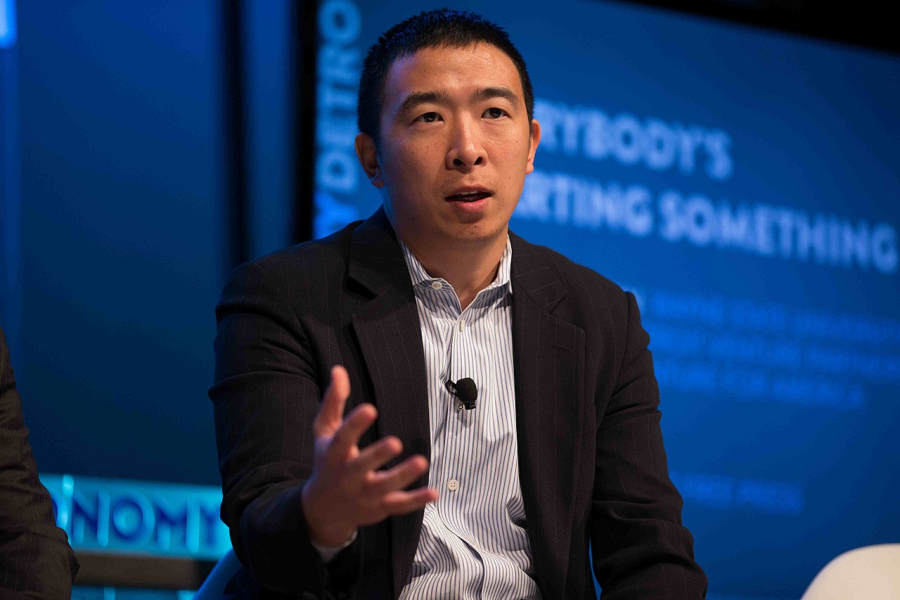Dozens of candidates have lined up for their chance to be elected President of the United States in the 2020 election. After over two years of his administration, President Donald Trump’s approval ratings have remained in a net negative and a large Democrat majority was elected to the House of Representatives in the 2018 midterms election, bolstering challengers’ hopes.
While most candidates are Democrats seeking the nomination of the party in absence of a clear nominee, there looks to be a fight emerging in the Republican party as well. From senators to governors, representatives to even just mayors, it is potentially anyone’s nomination to win.
Candidate Andrew Yang has received a decent amount of coverage in the media, although that hasn’t translated into success in the polls. His main platform is a Universal Basic Income (UBI) program, under which all Americans would receive a certain monthly income. Yang claims such a program would both help those struggling with money while also expanding the economy, although it would be only a supplement to normal income.
“I think his ideas for UBI are better than welfare… but I doubt he’s going to win,” junior Martin Ackermann said, agreeing with others who prefer his program to the policies put out by individuals such as Senator Bernie Sanders, although UBI has received its own share of criticism.
“[It] isn’t going to work because it’s going to require a tremendous amount of money to support… where’s the money coming from?” junior Daniel Christiansen questioned.
Another candidate is Senator Cory Booker (D-NJ). The former mayor of Newark has made compassion his main message, claiming it is the path to victory for Democrats in 2020. He has come under attack by some members of his party who believe that they should focus on investigating and prosecuting possible criminal activities by the current administration. However, it is uncertain whether he has left an accurate impression on the field.
“From what I remember, he is a far left Democrat, [at least] for America. I haven’t followed him that much, but he seems like a pretty upstanding dude,” junior Lucas Rivero said.
Although she hasn’t made much of a breakthrough either, Senator Kamala Harris (D-CA) is undoubtedly another key individual in the race. Recently, she has put abortion at the forefront of her campaign in reaction to the “Heartbeat bills,” which impose unprecedented restrictions on abortion, that have found success in several state legislatures. However, some take issue with her past record as Attorney General of California, where she vigorously prosecuted truancy cases, bringing legal consequences to parents whose children had frequent absences, which is argued to harm lower-income families and minorities.
Of all the candidates, Pete Buttigieg seems to have had the most meteoric rise. The mayor of South Bend, Indiana, gained prominence when coverage of his campaign increased and he attacked Vice President Mike Pence multiple times on his LGBTQ rights record. However, he continues to trail Sanders and Biden.
“He’s not really my first choice… he seems like a good person, but I don’t think you can go from mayor of a small city to President of the United States,” junior Jacob Martin said, echoing the common sentiment of Buttigieg’s critics.
Perhaps the closest candidate to Sanders, both in polls and ideology, is Senator Elizabeth Warren (D-MA). Almost consistently rising in support, Warren has made a name for herself through the release of dozens of plans for her potential administration. She has often been named as a successor to Ted Kennedy as the “Liberal Lion” of the Senate. The main issue her campaign faces is her overlap with Sanders’ own supporters, causing a split vote between the two candidates.
While Trump’s own renomination seems likely, there is still one notable candidate who seeks the Republican nomination next year. Former governor Bill Weld (R-MA) has been a frequent critic of the president. Although primary challengers often signal a vulnerable incumbent, polling suggests that his party still overwhelmingly supports him, with Weld holding only above ten percent of the vote.
There is still a chance for more candidates to join the race on both sides, although Governor Larry Hogan (R-MD), widely considered likely to run against Trump, has stated he will not seek the nomination.
While there is certainly no shortage of candidates to explore and choose from, it still seems that many students are unaware of many of them.
Sophomore Lan On also noted that he did not recognize several names from the Democratic primary field.
“I don’t know much about [the candidates,] I don’t really follow current events,” junior Marina Smith-Hanke said.


































